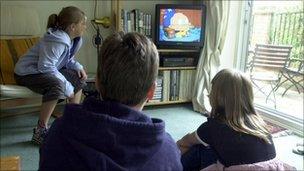Scots spend more time watching TV compared with UK
- Published

Scots spend 4.2 hours a day watching television
Scots watch more television than anyone else in the UK, a new report has suggested.
Ofcom's annual communications market report showed that the average Scot spent 4.2 hours a day in front of the box.
The figure is higher than the UK average of 3.8 hours a day and more than any other country in the UK.
The report also showed that the amount spent on television content produced in Scotland increased last year.
The output now accounts for 3.6% of networked programme spend by the four public service broadcasters, up from 2.5% in 2008.
This represents a 38% increase since 2006, and a rise in spend from £50m to £65m.
The report also examined how communications services such as broadband and mobile phones were used across the country.
Researchers found that Scotland had the lowest level of mobile phone ownership of any UK country at 85%, compared with a UK average of 89%.
In Scotland, people in rural areas were less likely to have a mobile phone - 80% compared with 86% in urban areas.
Broadband take-up in Scotland showed the smallest increase across the UK, at just 1% between 2009 and 2010 to reach 61%.
Fewer Scots also used the internet to access health, banking or government websites than elsewhere in the UK.
North of the border, 29% of households accessed online banking sites, below the UK average of 43%.
Vicki Nash, director of Ofcom Scotland, said: "This report provides a vital snapshot of communication trends in Scotland.
"Ofcom's data shows improving news for Scottish broadcasting, but also a slowing in demand for broadband - Scotland is now the least connected nation in the UK.
"With such obvious economic and social benefits to broadband, this development will be of interest to both policymakers and the public."
The study also found that radio listening was lower in Scotland than the rest of the UK - 21 hours a week compared with the UK average of 21.9 hours.
However, local commercial radio in Scotland received a higher share of listening (41%) than elsewhere in the UK where it was 32%.
Professor Philip Schlesinger, chairman of Ofcom's advisory committee for Scotland, said: "This annual report has now become indispensable to public debate in Scotland. I hope that many will discuss the findings and air their thoughts."
- Published19 August 2010